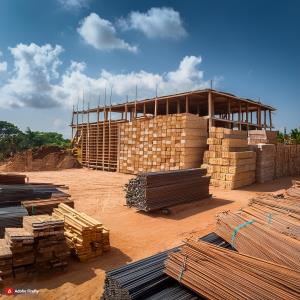2024 Guide to Building Material Costs in Ghana: Prices & Trends
 Illustrative Bar chart comparing prices of different building materials in Ghana
Illustrative Bar chart comparing prices of different building materials in Ghana
As of 2024, the costs of building materials in Ghana have been influenced by various factors including inflation, supply chain issues, and changes in demand. Here’s a comprehensive guide to current prices and trends for common building materials in Ghana:
1. Cement
- Price Range: GHS 55 - GHS 80 per 50kg bag.
- Trends: Cement prices have been relatively stable but may fluctuate due to changes in production costs and import duties. The demand for cement remains strong due to ongoing construction and infrastructure projects.
2. Sand
- Price Range: GHS 70 - GHS 120 per cubic meter.
- Trends: Sand prices have been increasing due to environmental regulations and the high cost of extraction. Coastal sand is generally more expensive than river sand.
3. Gravel
- Price Range: GHS 80 - GHS 150 per cubic meter.
- Trends: Similar to sand, gravel prices have seen an increase. The cost can vary depending on the size and quality of the gravel, as well as transportation costs.
4. Steel Reinforcement Bars (Rebars)
- Price Range: GHS 6,000 - GHS 9,000 per ton (for various sizes).
- Trends: Steel prices have been volatile, influenced by global steel market trends and local demand. Prices have generally been on an upward trend due to rising raw material costs and increased demand.
*********************************************************
Please subscribe to our YouTube channel
https://www.youtube.com/@Strathium
for Property related videos
(Renting | Sales | Construction | Real Estate Investment
**********************************************************
5. Blocks
- Price Range: GHS 6 - GHS 12 per block (6 inches x 9 inches x 18 inches).
- Trends: Prices for blocks have increased, influenced by rising material costs and demand. The type of block (e.g., solid vs. hollow) can also affect pricing.
6. Wood
- Price Range: GHS 30 - GHS 60 per plank (depending on type and size).
- Trends: Wood prices can vary significantly based on the type of wood (hardwood vs. softwood) and local availability. Hardwood is generally more expensive.
7. Roofing Materials
- Price Range:
- Metal Sheets: GHS 80 - GHS 150 per sheet (depending on gauge and coating).
- Tiles: GHS 20 - GHS 50 per tile (depending on type and quality).
- Trends: Metal roofing sheets are popular due to their durability, though prices can be high due to the cost of raw materials. Roofing tiles vary widely in price based on material and design.
8. Paint
- Price Range: GHS 120 - GHS 250 per gallon (depending on brand and quality).
- Trends: Paint prices have been affected by the cost of raw materials and packaging. Higher quality paints, including those with special features like weather resistance, are more expensive.
9. Electrical Wiring and Fixtures
- Price Range:
- Wiring: GHS 50 - GHS 100 per roll (depending on gauge and type).
- Fixtures: GHS 30 - GHS 200 per fixture (depending on type and brand).
- Trends: Electrical materials have seen price increases due to changes in import tariffs and the cost of raw materials. Quality and type of fixtures can significantly impact cost.
10. Plumbing Materials
- Price Range:
- Pipes: GHS 30 - GHS 70 per meter (depending on size and type).
- Fittings: GHS 10 - GHS 50 per fitting.
- Trends: Plumbing material prices have also been rising, influenced by global commodity prices and local supply issues.


Trends and Factors Affecting Prices
- Inflation: General inflation has affected the cost of building materials, leading to higher prices.
- Supply Chain Issues: Disruptions in global supply chains and import difficulties can lead to fluctuating prices.
- Demand: Increased construction activity and infrastructure projects drive up demand for building materials, influencing prices.
- Regulations: Environmental regulations and changes in import tariffs can impact material costs.
Advice for Buyers
- Shop Around: Prices can vary significantly between suppliers, so it’s worth comparing quotes.
- Consider Bulk Purchases: Buying materials in bulk or in advance can sometimes result in cost savings.
- Stay Informed: Keep up-to-date with market trends and potential changes in prices to plan your budget effectively.
“A great building must begin with the immeasurable, must go through measurable means when it is being designed, and in the end must be unmeasured.
”
–
Louis Kahn
Take note:
Software Architect, Real Estate Agent, Blogger & Entrepreneur
21 August 2024
4353 views
Do you have an article to publish?